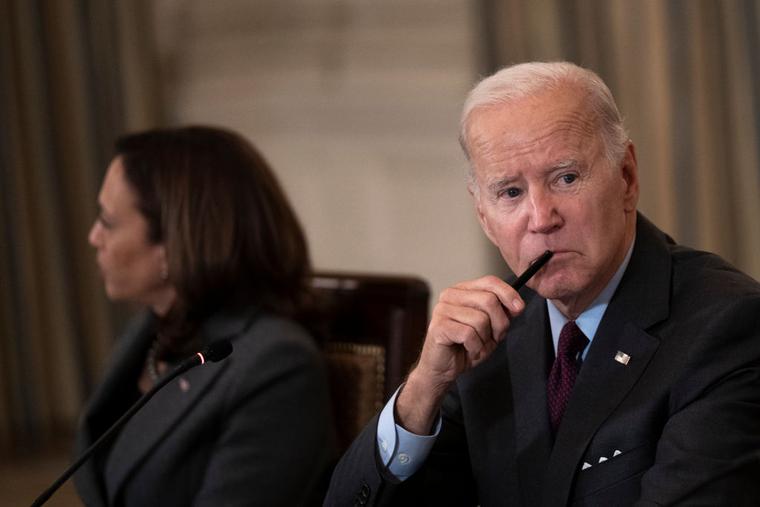EWTN/RealClear Poll Reveals Disconnect Between Biden Administration and Catholic Voters Over Transgender and Abortion Agenda
On life and gender issues, Church-affiliated, along with the U.S. public, favor limits, according to recent survey.

WASHINGTON — The majority of U.S. Catholic voters disagree with transgender ideology and abortion without limits, according to the latest EWTN News/RealClear Opinion research poll.
President Joe Biden, a baptized Catholic, has prioritized both of these issues for his administration, despite clear Catholic teaching against them. In addition to Catholic voters’ disagreement on these issues, other polling shows that the average U.S. voter also favors limits on abortion and is not in agreement with transgender ideology.
Thirteen percent of Catholics surveyed said abortion should be available to a woman at any time throughout her pregnancy, while about 8% said abortion should never be permitted under any circumstance.
The EWTN poll, conducted from Sept. 12 to 19, surveying 1,581 Catholic voters, found that 46.2% agreed with Roe v. Wade being overturned, while 47.8% disagreed, and 6% were not sure. Despite this apparent extensive support for Roe, most Catholics, 86.5%, favored limits on abortion, with 26.8% saying it should be allowed only in cases of rape, incest or to save the life of the mother, 19.8% saying until 15 weeks, and 13.1% wanting to limit it to the first six months of pregnancy, while another 9.9% want to restrict it after a fetal heartbeat can be detected.
Pro-Life Limits
The broader American public is similarly more in favor of Roe than opposed, but also widely in favor of limits on abortion, especially past the second trimester. A Pew research poll found that 57% of those surveyed disapproved of the overturn of Roe, while 41% approved. However, when questions were asked about abortion views by trimester in a May 2022 Gallup poll, most voters thought it should be limited to the first trimester, 71% of voters thought abortion should be illegal in the third trimester, and 55% thought it should be illegal in the second trimester. A Harvard Harris survey conducted in June 2022, after the Supreme Court overturned Roe v. Wade, found that 72% of voters, including 60% of Democratic voters, thought their state should not allow abortion past 15 weeks. Few Americans favor abortion being always or never legal. The American Family Survey, released in October, found that just 8% of those surveyed wanted abortion to be always legal, while just 19% wanted it to never be legal.
Carl Cannon, RealClearPolitics Washington bureau chief, told the Register that on the abortion issue, “the Democrats have done a really good job of saying the Republicans are extreme.”
He said that while majorities of Catholic and non-Catholic voters will oppose Roe being overturned, they don’t realize that Roe permitted abortion past 15 weeks and that they are actually in favor of limiting abortion more than Roe would have allowed. “They don’t really know what the law was before,” he said.
Regarding a proposal this month by Sen. Lindsey Graham, R-S.C., to bar abortion past 15 weeks nationally, Biden tweeted, “My dad used to say, ‘Joey, don’t compare me to the Almighty. Compare me to the alternative.’ And here’s the deal: Democrats want to codify Roe. Republicans want a national ban on abortion. The choice is clear.” White House Press Secretary Karine Jean-Pierre last month called the 15-week abortion limit “wildly out of step with where the majority of Americans are,” despite the consistent polling showing the public is in favor of limiting abortion to 15 weeks.
On Oct. 4, the president said that “the court got Roe right nearly 50 years ago,” and “Congress should codify the protections of Roe and do it once and for all.” However, he has also backed the Women’s Health Protection Act, a measure that goes far beyond “codifying Roe” and would bar almost any state limitations on abortion, including “a prohibition on abortion at any point or points in time prior to fetal viability ... a prohibition or restriction on a particular abortion procedure,” and even “a prohibition on abortion after fetal viability when, in the good-faith medical judgment of the treating health care provider, continuation of the pregnancy would pose a risk to the pregnant patient’s life or health.”
Wide Mass-Attendance Gap
The EWTN poll found that those who attended Mass more frequently were more pro-life, as 94.3% of daily Mass attendees agreed with Roe being overturned, while 5.7% disagreed; for those attending weekly, 59.6% agreed and 37.6% disagreed. For those who attended Mass once or twice a month, 50.5% agreed and 49.2% disagreed; and of those who went a few times a year, 37.5% agreed, and 53.8% disagreed.
Cannon said this poll shows, as past EWTN polling has shown, that “there’s a real dichotomy between observant Catholics, people who go to Mass a lot, versus people who are sort of born into the faith, are nominally Catholic, or go on Easter Sunday or Christmas Eve.”
Ryan Burge, an assistant professor of political science at Eastern Illinois University, highlighted data from the 2020 Cooperative Election Study (CES) showing a similar divide between regular Church attendees and Catholics in general on the abortion issue. The data shows 40% of those Catholics surveyed who attended Mass weekly would “allow abortion as a choice,” while 33% would make it “completely illegal.” For those who only attended yearly, 57% would allow it as a “choice,” while 16% would make it illegal.
Burge said that when it comes to “looking at Mass attendance and attitudes among Catholics,” those “who make it to church on Sunday are often more Republican than the ones who don’t,” pointing out CES data showing that 50% of those who attended weekly were Republicans, 41% were Democrats, and 9% were Independents. In contrast, among those who attended Mass yearly, 41% were Republicans, 44% were Democrats, and 15% were Independents.
Another area in the EWTN poll where the divide between weekly Mass attendees and those who rarely attend was apparent was in their response to whether Catholic political leaders who support abortion publically and promote policies that increase abortion access should refrain from taking Communion. Of the Catholics surveyed overall, 36.7% said they should refrain from taking Communion, while 49.3% did not think they should refrain. However, among those who attended Mass weekly, 46.7% thought these leaders should refrain from Communion, while 36.7% did not think they should refrain.
The U.S. Conference of Catholic Bishops (USCCB) reminded the faithful in their document last year on Eucharistic coherence that “if a Catholic in his or her personal or professional life were knowingly and obstinately to reject the defined doctrines of the Church, or knowingly and obstinately to repudiate her definitive teaching on moral issues,” they “should refrain” from Communion, without any reference to specific politicians.
Views on Transgender Ideology
Earlier this year, Biden pledged that his administration was “committed to advancing transgender equality in the classroom, on the playing field, at work, in our military and our housing and health care systems.”
On the 2020 campaign trail, he called transgender equality “the civil rights issue of our time.” Among his first actions as president was an executive order barring discrimination based on “gender identity” in school sports and locker rooms.
Among the Catholics surveyed in the EWTN poll, a decisive majority either strongly opposed, 63%, or somewhat opposed, 12.6%, biological boys who identify as girls competing against biological girls on school sports teams. That number was close to the 64.5% of weekly Mass attendees who strongly opposed it and the 15.5% who somewhat opposed it.
A NPR poll found similar results on the sports question among Americans in general, with nearly two-thirds of Americans (63%) opposed to “allowing transgender women and girls to compete on teams that align with their gender identity,” while only 24% supported it.
The EWTN poll also found that a majority of Catholics, 53.3%, said supporting transgender ideology conflicted with Catholic teaching, while 30.3% did not, and 16.4% were not sure. The majority was greater for weekly Mass attendees, as 63% thought the two conflicted and 26.6% did not, while 10.4% were unsure.
The EWTN poll also found that a majority of Catholics (53.3%) said supporting transgender ideology conflicted with Catholic teaching, while 30.3% did not, and 16.4% were not sure. The majority was greater for weekly Mass attendees, as 63% thought the two conflicted, and 26.6% did not while 10.4% were unsure.
In his apostolic exhortation Amoris Laetitia, Pope Francis wrote that gender theory “denies the difference and reciprocity in nature of a man and a woman and envisages a society without sexual differences, thereby eliminating the anthropological basis of the family. This ideology leads to educational programs and legislative enactments that promote a personal identity and emotional intimacy radically separated from the biological difference between male and female. Consequently, human identity becomes the choice of the individual, one which can also change over time.” He urged that “the young need to be helped to accept their own body as it was created.”
A survey by Nationscape, sponsored by the Democracy Fund, found that 67.8% of Americans agreed that there are only two genders, male and female, with 50% strongly agreeing with that sentiment. Majorities across religions agreed that there were two genders, with White evangelicals at 87.9%, Mormons at 78.8%, and Muslims at 77%. Among White Catholics, 69.7% agreed, and 65.1% of non-White Catholics agreed.
The Biden administration’s Department of Health and Human Services (HHS) has employed gender-neutral language in deference to the transgender movement, using terms like “pregnant people” in statements and social media.
This language was even more unpopular in EWTN polling, with 81% of Catholics surveyed being opposed to the language of “persons with potential to get pregnant” replacing the word “women,” while 8.4% were for it, and 10.6% were not sure.
Cannon told the Register that “Catholics know where they are” on this issue, and it’s not where the rhetoric of the far left is. He added that “Americans are not intolerant towards the idea of transgender people, but I think they resent being told they can’t even talk about it.”
He said voters are “tired” of these language debates and, if the election could be framed in terms of “Can I use the word ‘mother’ or not?” he said, “Democrats would lose every race.”














